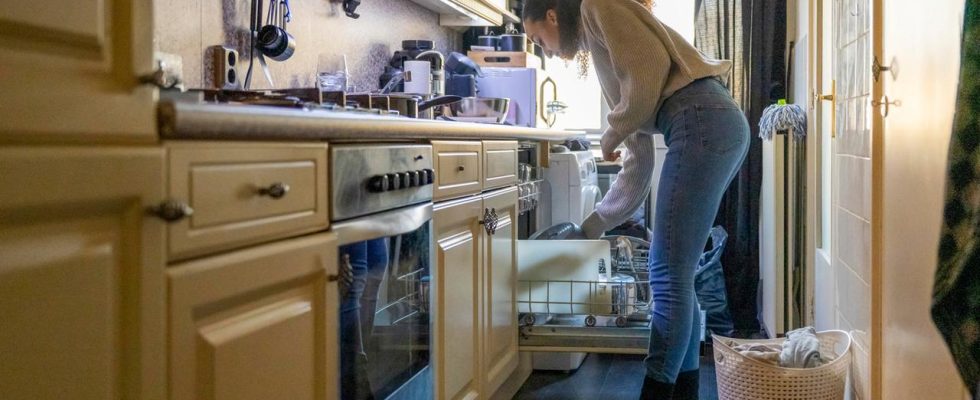Household, childcare, caring for relatives: women do more unpaid care work than men. This not only has consequences for your pension, but also for the job market. What can men do for change?
Michel Rothgaenger says he came to the realization that his wife does more than he does during the corona pandemic. Previously, the father of two children lived a classic family image: “As a man, you just go to work, have important appointments and then you come back to your family every now and then.”
When both he and his wife Stefanie Salomon, both managers, had to work from home during the lockdown and at the same time no one else could look after their two sons, the logistics HR consultant realized “that it’s not fair at all”: to expect them coordinates and manages everyday family life, while she is also just as challenged at work as he is.
77 minutes more every day
The couple’s solution: They divide each day into six-hour shifts. If one sits at the desk, the other looks after the children, cooks, washes and cleans – these tasks are called care work.
In Germany they are predominantly taken on by women: According to figures from the Federal Ministry for Family Affairs They spend almost 30 hours a week caring for others – men, on the other hand, only spend 21 hours a week. That’s a difference of 77 minutes every day.
They usually do not receive any money or compensation for their earnings, and at the same time they have less time for work or to rest. The consequences: Women receive less income over the course of their working lives – and less pension afterwards.
In “heterosexual couple households with children,” as the ministry calls a classic family, the divergence is particularly great: “While fathers do more paid work than men without children, mothers of young children in particular do less paid work than women without children in the household,” states the recently published time use survey. Little has changed with this model in ten years.
“Equal Care Day” campaign day
Michel Rothgaenger isn’t the only one who thinks this is unfair. With the “Equal Care Day”, which the activist couple Almut Schnerring and Sascha Verlan invented, they and other committed people and groups want to draw attention to the unequal distribution of care work. In order to make the concern tangible, they declared February 29th a day of action – a day that is invisible in three out of four years and is intended to symbolize how the additional workload is usually ignored.
“There needs to be a fundamental change when growing up so that boys are also raised to take on care tasks and later reflect as men: How do I live my relationships? How do I take responsibility?” describes Verlan, who is the father of three children. He restricts: “We will not be able to solve this challenge on an individual level.”
“As of course provided”
Anja Weusthoff from the Alliance Care Work Fair Sharing, an umbrella organization of social associations supported by the German Women’s Council, sees the federal government as having a duty: “This requires good framework conditions that are shaped by political decisions.”
She cites equality policy projects as examples: “The two-week paid leave for fathers and second parents after the birth of a child, the expansion of non-transferable parental allowance months and wage replacement benefits for care periods.”
Instruments that Equal Care Day co-inventor Sascha Verlan finds helpful but not sufficient. “What I often miss in the discussion is the entire economic area: how much companies benefit from the fact that care work is taken for granted and therefore exploited,” he says.
So-called human capital of skilled workers and well-trained employees does not simply fall “from the sky”, but is the result of years of upbringing and education – i.e. the attention and effort that parents, educators or teachers have provided free of charge or for a low fee. Verlan therefore calls for a fundamental rethinking of the way economic and social structures are organized.
Divide work fairly – but how?
Not everyone who advocates for “equal care” goes that far. But they agree: Even seemingly small changes in everyday life make a big difference. Because there is still the “mental load”: the task of being the family’s control center and thinking about everything at all times. The Equal Care initiative by Schnerring and Verlan has published a quiz on their website, which is intended to help “custody communities” – i.e. couples and families – to recognize how this workload is distributed among them.
Michel Rothgaenger and Stefanie Salomon show their two sons that father’s and mother’s appointments are equally important: they now divide wage and care work on a daily basis.
Anyone who has a “short day” works in the office for five hours and then takes care of the children and household; This is followed by a “long day” of eight hours of work. Swap and jump in are possible by comparing their calendars. “Whoever has fewer appointments that day has won,” says Rothgaenger – that means: takes on the care work.
Rethinking companies
The HR consultant also sets new standards in the logistics industry in his company by hiring mothers and training single parents without hesitation – in his experience, they are particularly well organized. It still happens that a company tells him: No women please!
“We then counteract this very strongly by only suggesting women and thus forcing them to hire women,” says Rothgaenger. “That works quite well.”
But above all, companies must understand that they are not providing social service, but rather have an economic advantage: If you break away from old patterns of working hours and gender roles, you will ultimately have more skilled workers to choose from.

